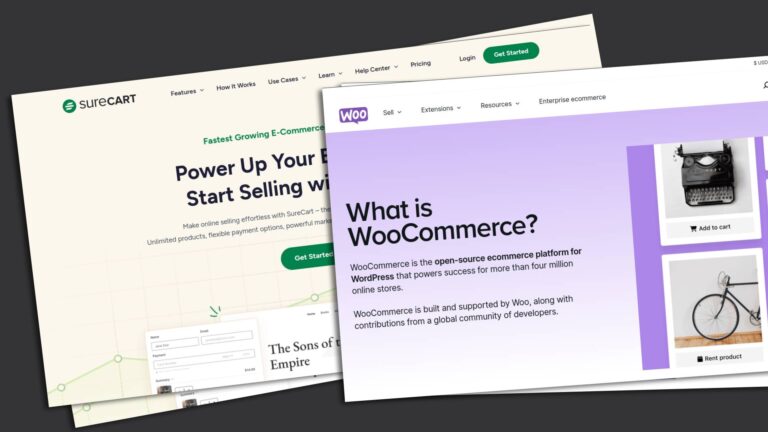When deciding to launch an online store, choosing the right e-commerce platform is crucial. Shopify and WooCommerce are two of the most popular choices, each offering distinct advantages and disadvantages. In a head-to-head battle of Shopify vs. WooCommerce – which platform will reign supreme?
There are great arguments for both platforms, so let’s talk about the pros and cons of each!
Shopify
Pros
- User-Friendly Interface and Easy Setup: Shopify offers an intuitive, user-friendly interface that simplifies the setup process, making it ideal for beginners and those without technical expertise.
- All-Inclusive Solution: Shopify includes hosting, security, and caching, providing a comprehensive solution that handles the technical aspects for you.
- 24/7 Customer Support: Shopify offers round-the-clock customer support, ensuring help is available whenever you need it.
- Wide Range of Apps and Plugins: Shopify’s App Store offers numerous apps and plugins, allowing you to extend your store’s functionality easily.
- Seamless Integration with Third-Party Services: Shopify integrates effortlessly with various third-party services, enhancing your store’s capabilities.
- Scalability: Shopify is built to support businesses of all sizes, making it easy to scale as your business grows.
- Built-In E-Commerce Features: Shopify comes with built-in features specifically designed for e-commerce, streamlining operations and improving efficiency.
Cons
- Higher Transaction Fees: Unless you use Shopify Payments, you’ll face higher transaction fees.
- Limited Customization: Compared to WooCommerce, Shopify offers fewer customization options.
- Dependence on Shopify’s Ecosystem: You’re reliant on Shopify’s ecosystem, which can limit flexibility.
- Higher Costs: Shopify has higher initial and monthly fees, and costs can increase with add-ons and integrations.
- Less Control: Users have less control over the platform compared to self-hosted solutions like WooCommerce.
WooCommerce
Pros
- Free, Open-Source Plugin: WooCommerce is a free, open-source plugin for WordPress, offering a cost-effective solution.
- Greater Flexibility and Control: WooCommerce provides extensive flexibility and control over your store’s design and functionality.
- No Transaction Fees: With WooCommerce, you can choose your payment gateway without incurring additional transaction fees.
- More Customization Options: WooCommerce allows for extensive customization, enabling you to tailor your store to your specific needs.
- Better SEO Performance: WooCommerce tends to perform better in terms of SEO capabilities, thanks to its integration with WordPress.
- Cost-Effective: WooCommerce can be more cost-effective, especially for smaller stores, with most plugins requiring a one-time payment.
- Full Access to Source Code: Users have full access to the source code, allowing for deeper customization and control.
Cons
- Requires a Self-Hosted WordPress Website: WooCommerce requires you to have a self-hosted WordPress website, adding complexity.
- More Technical Setup and Management: Setting up and managing WooCommerce can be more technical and time-consuming.
- Limited Customer Support: WooCommerce relies more on community support and documentation rather than dedicated customer support.
- Security and Maintenance: Users are responsible for their store’s security and maintenance.
- Steeper Learning Curve: WooCommerce has a steeper learning curve, particularly for beginners.
- Potential Additional Costs: Hosting, domains, and premium plugins can add to the overall cost.
Key Considerations
Ease of Use
- Shopify: Easier to use with a simpler setup process, making it more accessible for beginners.
- WooCommerce: Requires more technical knowledge and setup, suitable for users comfortable with WordPress.
Customization
- WooCommerce: Offers greater flexibility and control over design and functionality.
- Shopify: Limited customization options compared to WooCommerce.
Costs
- WooCommerce: Can be more cost-effective, particularly for smaller stores with fewer monthly expenses.
- Shopify: Fixed monthly fees and potential transaction fees make it pricier, especially for small businesses.
Scalability
- Both platforms: Can scale with your business. However, Shopify’s built-in features and comprehensive support may make it better suited for rapid growth.
SEO
- WooCommerce: Tends to offer better SEO performance due to its integration with WordPress.
- Shopify: While capable, it may not match WooCommerce’s SEO capabilities.
Support
- Shopify: Offers 24/7 customer support.
- WooCommerce: This relies on community support and documentation, which can be less reliable.
Shopify Vs. WooCommerce: The Winner…
Choosing between Shopify and WooCommerce depends on your specific needs, technical skills, budget, and long-term business goals. Ultimately, Shopify is the better platform to go with. The learning curve is similar, so if you’re new to both it’s not like one is significantly easier to learn. However, Shopify is literally an e-commerce platform first, and WooCommerce is just an add-on to WordPress.
- Shopify: Ideal for those seeking an easy-to-use, all-in-one solution with robust customer support, especially for beginners or those without technical expertise.
- WooCommerce: Best for users who want more control, customization options, and are comfortable managing a self-hosted platform.
So, which platform do you think is the winner? Shopify vs. WooCommerce – the WordPress plugin, or the dedicated e-commerce platform?





